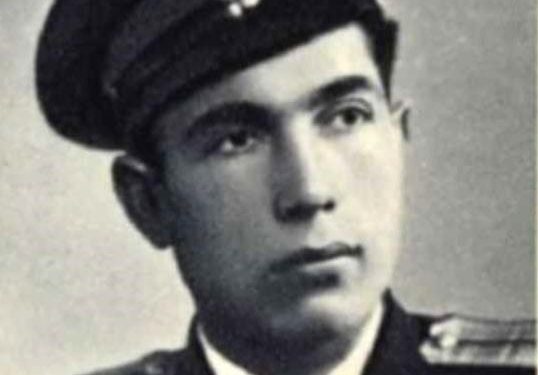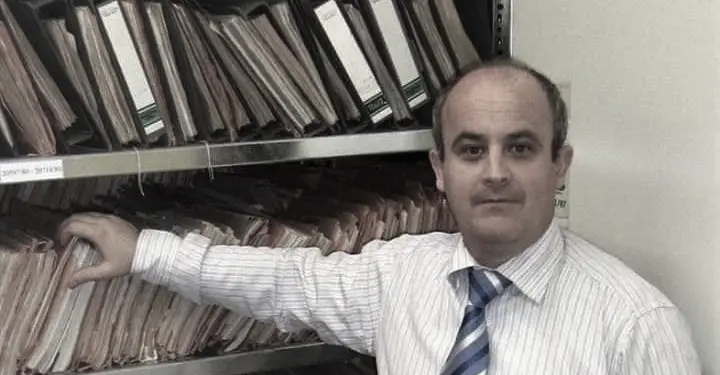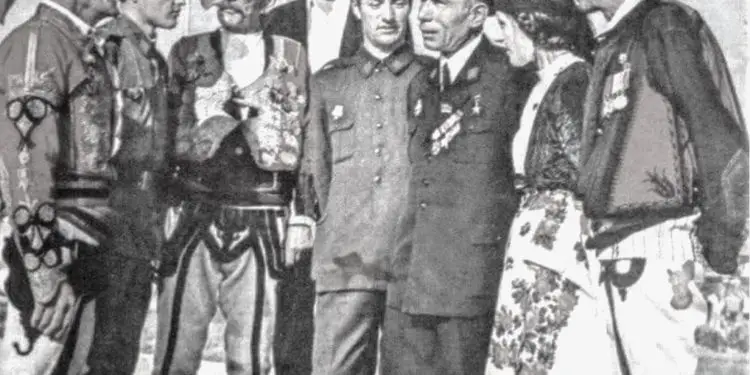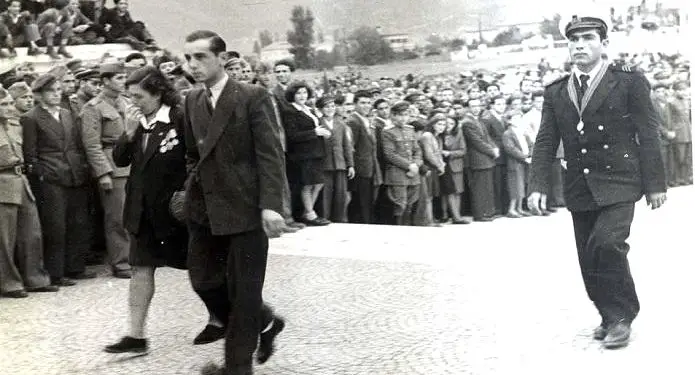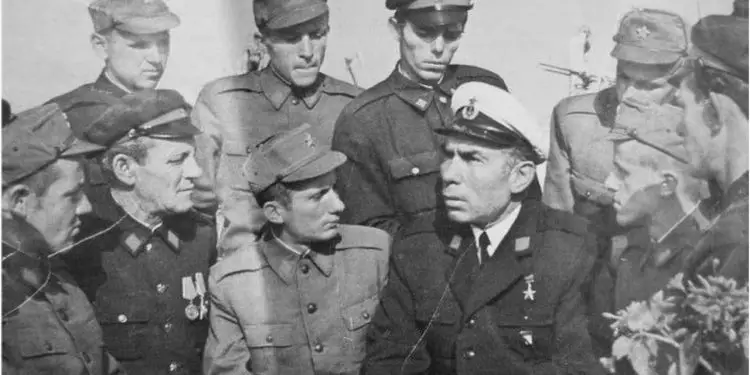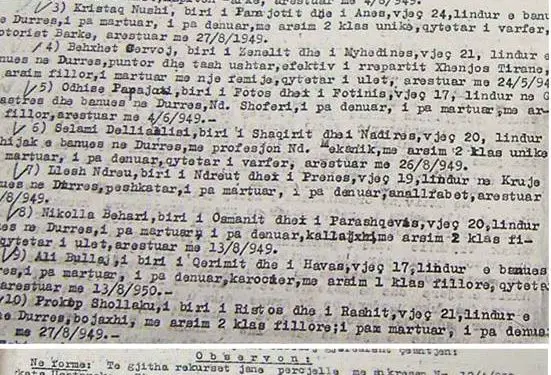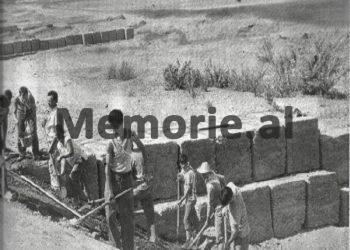By Kastriot Dervishi
Memorie.al / For years, generations have fixed in their memory, the story of a failed escape at sea, given in the feature film of the former Kinostudio “New Albania”, titled; “Silent Duel”. The claim was that; on June 1, 1947, the motorboat was launched by professional sailors and brought ashore by a man who had never piloted such a craft. The whole event took place within 4 hours. It cannot have developed far from the coast. The event took place between 4 people.
The fourth who became a “National Hero”, didn’t even know how to drive the motorcycle. There were no commissary stories here, nor others that have been seen in the film, with civilians entering the motorcycles. Was it really an escape from 22-year-old Spiro Stojan Kota, or was it a bloodbath in the middle of the sea and an event exploited afterwards?
All the signs given lead to the reasoning that; a man who had not been driving a vehicle, could not, for two hours, turn around the motorcycle, could not become a “Hero”! But anyway, the regime needed it as an event, not only to use it as an example within the Armed Forces, but also to show the people that this is how those who leave Albania end up.
The event has been little investigated. There is a lack of data that would be related to issues of expertise, or other issues of this type. Only a dry report is what is documented, while those who experienced it are no longer alive. Of course, it always remains intriguing; how three seasoned sailors, who could throw him into the sea whenever they wanted, let themselves be killed in that way…?!
As the strongest thesis, the version appears that a quarrel between them had been all and this not far from the coast, that if it was far, the soldier Spiro Kote, without a compass, would wander in vain through the sea. Some time ago, our colleague Fatos Baxhaku published an interesting report from Durrës, related to this event.
The reportage brings untold testimonies from people who are involved in this history, as well as those who still experience it through memories of the past. Here is what Fatos Baxhaku writes at the end of his writing:
The story starts to get even more confused, when some old people from Durrës, tell us with conviction a version that they heard from Ndoc Gjeluci, the captain of the port port at that time. Gjeluci told his close people that the true story of the event is more or less like this: “The three sailors had no intention of escaping; they just wanted to go out to sea for fun”.
The first officer, who met Spiro Koten, while he was standing in shock on the wrecked ship, was Anastas Qendro, the very one who put the ship in the port, to whom he said; “They started killing each other. Only Vlashi was killed by me”.
After this narration, the “hero” repeated that old adage; “the first one, the second one, the third one” and the mystery was hidden over there, 30 miles away from Durrës.
Killed in this event were:
1 – Captain Vlash Bushi, son of Vasili and Katerina, born July 5, 1912, born and resident in Durrës.
2 – Sailor Xhemal Kërniqi, son of Mustafa and Bedria, born February 13, 1920, born in Shkodër and resident in Durrës.
3 – Sailor Enver Kruçi, son of Alushi, born June 24, 1924, born and resident in Shkodër.
All three in the service of the captaincy of the port of Durrës, deceiving the guard of the motor cruiser “Mujo Ulqinaku”, sailor Spiro Kote, with different pretexts, set off to escape to Italy.
In the report dated June 5, 1947, of the Durrës Directorate of Internal Affairs, it is stated, among other things:
“When they had left 30 miles near the Mezocanal, they informed the sailor on guard of the intention of betrayal and flight to Italy. Then the sailor in question, seeing the betrayal and deception that they had done to him, thought and took measures to kill them with an automatic machine, which was hanging in the sleeping room of the motorboat.
Taking advantage of the fact that the two traitors were at the wheel, he kills the third in the room and then kills the other two, one by one. After performing this deed, he took the command of the motorboat himself (although he had never used it, as he was a young sailor) and returned to Durrës, at 20.00, informing the captain about the incident and how he could have avoided the betrayal”.
In a report dated 4.6.1947, by the political secretary of Durrës, Iljaz Reka, for the Regional Committee of the Communist Party of Albania, positive things are written about Spiro Kote, which has increased even more the suspicions that this is an event of made up. The biography drawn up by the local NPSH does not appreciate Spiro Koten at all.
The origin of the family, from Macedonia, originally in Korça. My father came to Durrës as a child, 16 years ago. Spiro Kote was born in Korçë, but came to Durrës as a child. Finished primary and 2nd agricultural class in Kavaje. There he saw partisans twice and began to sympathize with them.
In v. 1943, Spiro leaves school and goes to Tirana where he works as a carpenter. In 1945 he came to Durrës where he worked as a carpenter in the port. Called to arms in Gjirokastra. Since he worked at the port, they keep him there. In v. 1946, 10 days before the event, he joined the ranks of the communist youth, but did not participate in the meeting.
“This man spent his life before he went to the army, in suffering, i.e., constantly with hard work. In our city, it was not organized, because in childhood, it did not have a good moral attitude. Now it gives you the impression of a simple worker, not mischievous, an active and disciplined worker. During the entire occupation, he was unorganized, but he was interested in finding communiqués and reading them” – concludes Iljaz Reka’s report about him.
With decree no. 343, dated 6.6.1947, the Presidium of the People’s Assembly decorated Spiron Koten with the order “National Hero”, with this motivation: “Equipped with the highest feelings of love for the people’s homeland, with heroism, self-sacrifice and his endless loyalty, he became the example of the loyal warrior of the National Army”.
His story, given not as it happened, would certainly be part of the regime’s propaganda, to motivate espionage in cases of escapes, as well as to make as many gullible as possible, imitate the “bravery” of the film’s character.
Attached to this article, we are publishing the photo where Spiro Kote, on the order of the “National Hero”, entering the hall of the First Congress of the KPSH, November 1948, as well as part of the documentation of the event, or of its decoration. Memorie.al




